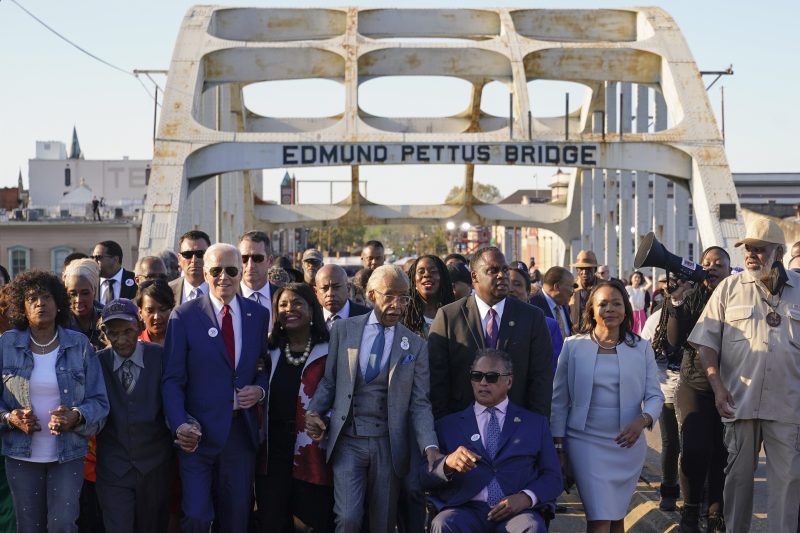
In Selma, Biden stresses voting rights in face of divided Congress


SELMA, Ala. — President Biden came to this seminal site of the civil rights movement — one that led to the signing of the Voting Rights Act in 1965 — to try to inject urgency into changing the country’s voting rights laws once more.
Standing near the Edmund Pettus Bridge, where on March 7, 1965, marchers advocating for voting rights were attacked by police in a day that has become known as “Bloody Sunday,” Biden said that the right to vote “was under assault” by a conservative Supreme Court, a host of state legislatures and those who continue to deny the 2020 presidential election results.
“As I come here in commemoration, not for show, Selma is a reckoning,” Biden said. “The right to vote and to have your vote counted is the threshold of democracy and liberty. With it, anything’s possible. Without it, without that right, nothing is possible. And this fundamental right remains under assault.”
Biden is attempting to elevate an issue that he unsuccessfully fought for since the start of his presidency, channeling evocative images to urge Congress to pass voting rights changes despite hardened political divisions on Capitol Hill.
He invoked the legacy of John Lewis, the late congressman and civil rights icon who was beaten on the bridge that Biden came to walk across 58 years later. The president and other leaders have pushed for legislation named after Lewis that would reauthorize parts of the 1965 Voting Rights Act that were struck down by the Supreme Court in 2013. The House passed a bill in 2021, but the measure failed to get a vote in the Senate. Prospects for the legislation this year appear grim after the GOP gained control of the House in the 2022 midterms.
After the speech, Biden walked with several dozen Black leaders, lawmakers, and others across the bridge, linking arms as an act of solidarity in a place once symbolizing strife. One member of the group led spiritual songs as they crossed and, once they crossed to the other side, the Rev. Mark Thompson offered a prayer to “make this the day we never leave Selma behind.”
It was here in 1965 where demonstrators, Lewis among the leaders, gathered several weeks after an Alabama trooper shot a young Black man named Jimmie Lee Jackson. As a 25-year-old Lewis and 600 others walked across the bridge, they were beaten with whips and billy clubs by Alabama state troopers at the start of what was supposed to be a 54-mile walk to the state capital in Montgomery.
The images of police brutality galvanized the nation. Shortly after, President Lyndon B. Johnson introduced the Voting Rights Act of 1965.
It has been a place where others — including Biden himself — have come and called for a renewed fight for voting rights, pushing for more early voting or combating voter ID laws and other barriers that have been introduced since the 2020 election, particularly in states with GOP-controlled legislatures.
It was the first time Biden visited the site as president, and even in his long political career, he has only come here a handful of times. While civil rights has often been a point of pride for Biden in his early years in politics, it has also been a source of regret.
In 2013, when he delivered remarks as vice president to the nation’s first Black president, he made some unscripted remarks before joining the crowd in walking across the Edmund Pettus Bridge.
“I regret — and although it’s not a part of what I’m supposed to say — I apologize it took me 48 years to get here,” Biden said. “I should have been here. It’s one of the regrets that I have and many in my generation have.”
He had watched the first march, he said, while he was a senior in college. It was an event that he said would inform his worldview and harden his convictions.
“I remember feeling how guilty I was I wasn’t here,” he said here on Sunday. “How can we all be up there and you going through what you went through? I can still picture the troopers with their batons and wands and whips.”
Biden also spoke in Selma in 2020 during his presidential campaign, addressing a crowd at the historic Brown Chapel AME Church hours after winning the South Carolina primary — a victory that would propel him to the nomination. In 2021, he recorded a video message that played during the event.
Each time Biden has spoken, he has referenced the need to expand voting rights.
“What you all did here 48 years ago changed the hearts and the minds of the vast majority of the American people. That’s why I am absolutely convinced we will prevail in this new fight in regard to voter access and voting rights,” Biden said a decade ago.
It’s a theme he returned to here on Sunday.
“No matter how hard some people try, we can’t just choose to learn what we want to know and not what we should know,” Biden said. “We should learn everything — the good, the bad, the truth — of who we are as a nation. And everyone should know the truth of Selma.”
He sought to connect the events of 58 years ago with modern times.
“After a deadly insurrection on January the sixth, we must remain vigilant,” he said. He referenced some of the legislation he has pushed, and executive orders he has signed.
“But we know that we must get the votes in Congress to pass the John Lewis Voting Rights Advancement Act and the Freedom to Vote Act,” he said. “I made it clear I will not let a filibuster obstruct the sacred right to vote.”
Biden also mentioned other parts of his agenda, including assault weapons ban, economic policies, and criminal justice overhaul. He also mentioned disaster relief money for this area, which is recovering from tornadoes two months ago.
After touting health care policies, sounding like a candidate running for reelection with a slogan, he shouted: “Let’s finish the job!”
Several prominent civil rights activists, including the Rev. William Barber II, wrote to Biden and members of Congress ahead of the events in Selma saying they were frustrated that more hasn’t been done to spur the systemic changes they believe are necessary.
“Voting rights were not highlighted in this year’s State of the Union, but we have less voting rights protections today than we had Aug. 6, 1965,” the group wrote. “Economic investment in the South and places like Selma was not a central theme in this year’s State of the Union, but we know that if you suppress votes and block living wages, poor people of every race suffer and the promise of democracy is undermined.”
Biden has previously sought to use historic sites to urge change. In July 2021, he traveled to Philadelphia, speaking at the National Constitution Center, and delivered a forceful condemnation of a wave of voting restrictions, comparing them to the biggest threat to American democracy since the Civil War. In January, he delivered a sermon at Ebenezer Baptist Church, the Atlanta church where Martin Luther King, Jr. once preached, calling for change.
During the first year of his presidency, he often resisted calling for the Senate to override the filibuster, which was seen by advocates as the best, and perhaps only, way to usher in the kinds of changes Biden is seeking. He later did push for changes to the Senate rules to pass voting rights legislation — and he turned up the rhetorical heat by suggesting those standing in the way of the legislation were aligned with racist policies and politicians. But the legislation, which passed the House, never passed the Senate.
Now his party has lost control of the House, making any sweeping changes even more unlikely.
Several in the crowd said they were disheartened that voting rights is less secure now than it was in 1965, but they didn’t blame Biden for the setbacks.
“[Senate Minority Leader] Mitch McConnell and other so-called representatives need to do more,” said Earl Kelton, a 77-year-old retired educator from Augusta, Ga. “He can only sign a bill. It’s the Congress that’s got to be held accountable. He can use his bully pulpit, but he cannot pass legislation.”
“It’s like his hands are tied,” said Delores Gresham, a 65-year-old retired health care worker from Birmingham. “He can only do so much.”
Rep. James E. Clyburn (D-S.C.), an influential White House ally whose endorsement of Biden was credited with salvaging his 2020 primary campaign, said here in Selma that any lack of progress was the Senate’s fault. “I think most people know that,” he said.
“We all know that issue is held up with the filibuster, and we can’t get the votes necessary to break the filibuster. The president doesn’t have a vote in the Senate,” he said. “This is a senate problem. We’ve got to get senators elected who are willing to get rid of this — let’s just call it what it is — Jim Crow era law.”
